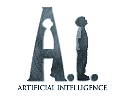|
By : Jim Pinto, San Diego Mensan, September 2001 |
|
Spielberg's latest movie: Artificial Intelligence is about a new age possibility - synthetic love.
The idea for the movie came from a 1969 short story by Brian Aldiss - Supertoys Last All Summer Long. Stanley Kubrick (2001: A Space Odyssey, ’68 the movie with HAL the computer) worked on this material for 15 years, before passing it on to Steven Spielberg before he died. The movie is set in the future - global warming has drowned the world's coastlines, but life is pleasant in the small high-tech, cloistered suburbs where elite human survivors live, thanks to the exploitation of “mechas” - humanoid robots of all types.
But then the real son Martin recovers and suddenly the two boys (human and robot brother) are fighting for their mother’s love. Martin is sneaky, disobedient, sarcastic and manipulative - the human frailties that most real kids might have - and we discover that we prefer David to his human brother. David remains an eternal outsider, despite his good-natured flexibility, his blue-eyed good looks and ceaseless attempts to please. His father and especially his brother ignore or persecute him, causing family stress. His mother finally faces a shattering decision: She must remove the non-child, whom she loves as much as the real child, from the family. But, rather than simply destroy him, she takes him to the woods and abandons him (as perhaps you and I have done with a stray dog or bird we couldn’t keep). This opens the second section of the movie, as the little mecha (and Teddy, his mecha pet bear) wander lost through the world in the cruel and merciless mecha killing grounds. David finally realizes that he is an android made of metal and circuits. He goes on a desperate journey, like Pinocchio, to evade his tormentors and somehow make himself into a real boy to earn his mother’s love. The movie then moves into spectacular scenes set in a drowned New York. David settles down to wait a very long time for his mother to return to him and the movie intends his wait to be poignant. Thousands of years later, future “beings” find him and re-construct his mother (from DNA fragments) and he spends some blissful time, bathed in her love. The ending is too far-fetched and syrupy; a couple of possible earlier endings that would have resulted in a tougher but more realistic movie. Spielberg accentuates the warm and cozy side of artificial intelligence, but fails to show the more sinister possibilities. He might consider Stephen King as the writer of his next story line - undying love turned to indestructible hate. A.I. is worth seeing, perhaps for nothing more than the thinking it generates about intrinsic feelings like love and what it means to be human. It brings up several technical and moral questions that are inextricably intertwined. Many leading futurists believe that synthetic intelligence will advance beyond human capabilities within the next few decades. Will it be possible to create a self-aware and reasoning entity that has the capacity for love and all the other (good and bad) qualities we ascribe to human beings? If that intelligence can love, can it also hate with equal intensity? If we create something that loves us, do we have a responsibility to love it in return? Will synthetic intelligence develop spirituality? At some “critical intelligence” level, will a robot have a soul? Must we believe that a human creation of superior intelligence contradicts the laws of the human Creator? Or, is it reasonable to think that any creation is simply an evolutionary extension? Will future techno-humans (robots, or part-humans) perhaps be equivalent to just another species, or race? Of course, A.I. is just a movie - but it generates intense thinking on all kinds of questions relating to robots and synthetic intelligence, as a precursor of what a lot of futurists think will inevitably happen in this new century.
Advertising If you loved the movie, pick up a Movie Poster from the film. Buying Original Movie Posters online is a great way to put a little Movie Memorabilia in your home. Hollywood Movie Posters also make great gifts for the Movie fanatic in your life.
|
Return to Index of all JimPinto Writings

 Return to JimPinto.com HomePage
Return to JimPinto.com HomePage
If you have ideas or suggestions to improve this site, contact: webmaster@jimpinto.com
Copyright 2000 : Jim Pinto, San Diego, CA, USA

 A young couple whose only son is stricken with a fatal disease but is cryogenically preserved, awaiting a cure, is offered a lifelike, humanoid son, David - played by Haley Joel Osment (Sixth Sense - “I see dead people”). The mother is warned that once she permanently “imprints” the robot child (with a sequence of key-words) his love for her could never be erased. After some qualms, she proceeds, and becomes the object of his unconditional, intense and indestructible love. The way David utters the words “mommy” is endearing - but eerie when you remember that he is a robot.
A young couple whose only son is stricken with a fatal disease but is cryogenically preserved, awaiting a cure, is offered a lifelike, humanoid son, David - played by Haley Joel Osment (Sixth Sense - “I see dead people”). The mother is warned that once she permanently “imprints” the robot child (with a sequence of key-words) his love for her could never be erased. After some qualms, she proceeds, and becomes the object of his unconditional, intense and indestructible love. The way David utters the words “mommy” is endearing - but eerie when you remember that he is a robot.